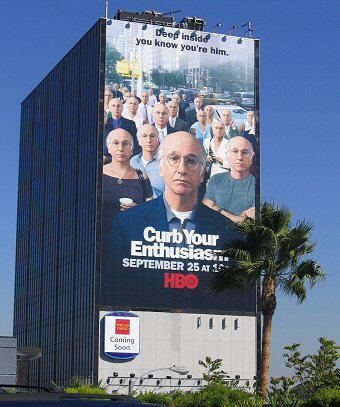Midlife Surge
Maybe I’m slow, but my awareness levels suddenly shot up the other day about Gong Li, Gong Li, Gong Li…some eighteen years after her film debut, and just over three months shy of her 40th birthday.
This was after hearing she gives the big burn-through performance in Memoirs of a Geisha (Columbia, 12.5). The word, in fact, is that she pretty much steals it from Zhang Ziyi, the star…as far as the “whoa, mama” thing is concerned. I mean, take it with a grain…

A seemingly dated photo of Gong Li, costar of Memoirs of a Geisha
Remember she was also great in Wong Kar Wai’s 2046 as well as in that short Wong directed for the anthology film Eros called “The Hand,” which I thought was the best of the three.
And that she’s playing the third-lead role of “Isabella” in Michael Mann’s Miami Vice (Universal, 7.28) right after Crockett (Colin Farell) and Tubbs (Jamie Foxx). Going by the script I have, Isabella is a financial-strategic sharpie (i.e., “I run the numbers”) involved in the high-end drug business.
< ?php include ('/home/hollyw9/public_html/wired'); ?>
This locks it in on these shores. If Michael Mann thinks you’re cool and desirable, you’re cool and desirable.
And then comes…wait a minute, a young Hannibal Lecter movie called Behind the Mask, directed by Peter Webber (The Girl with a Pearl Earing)? That sounds like a mistake, no? This is Dino de Laurentiis going to the well for more cannibal bucks ….the fiend.
I first laid eyes on Gong Li in the late 80s when I caught her lead performance in a video of Red Sorghum, which I remember as being a good film that I wished would be over sooner.
I never saw The Story of Qiu Ju (’92), for which she was named Best Actress at the 49th Venice Film Festival, but everyone saw Farewell My Concubine (’92), for which she won an acting award from the New York Film Critics. She was 27 when that happened.

Then I kind of went to sleep on her until last year when everything started surging again.
An actor’s career karma can be very touch and go. You can be cold or warm or treading water and then wham, the bells go off and everyone wants you.
When I ran that item about Gong Li’s alleged stand-out performance work in Mem- oirs of a Gesiha, Vinod Narayanan wrote in and said…
“This was always going to happen. Not that Zhang Ziyi is a bad actress or anything, but Gong Li is something else.
“Check out the early Zhang Yimou flicks from Red Sorghum through Raise the Red Lantern up until To Live and Shanghai Triad. Or, if you can find it, the uncut version of Chen Kaige’s Temptress Moon.
“She’s a terrific actress and easy on the eyes. Very easy.”
Fail Safe
Big wipe-outs are what gifted risk-takers do on occasion. Any talented director can drop the ball, blow it…step on a land mine.
Is this something to be ashamed of? That’s probably putting it too strongly. Some- thing to duck, I suppose…as long as you don’t take it to extremes. Like tucking yourself into a fetal-ball position and refusing to get up, dust yourself off and get back on the horse.
Keep plugging, keep becoming. Sounds trite, doesn’t it?

Into the Blue
There is so much failure going on right now that it’s a little bit scary. The big fall and holiday movies are getting seen and picked off, one after another, and a lot of them made by veterans who are supposed to know what they’re doing.
Of course, nobody knows anything. They might have a knack, but they never have the key. Creation is always about starting from scratch, and anyone who says they haven’t second-guessed themselves and had Garden-of-Gethsamane mom- ents is lying.
I heard from a guy today about The Producers…I’ve been hearing from others about Memoirs of a Geisha. The crack of rifle fire in the distance, muffled by trees.
Next week I’m expecting to see the re-edited (i.e., shorter) version of Cameron Crowe’s Elizabethtown, but nothing will undo the trauma I went through when I saw the Toronto Film Festival version.
It was like being with Willem Dafoe’s Sgt. Elias in an early scene from Oliver Stone’s Platoon, and watching him fall into a pit filled with razor-sharp bamboo sticks.
Poor John Stockwell. Today can only be regarded as a day of mourning with the nationwide opening of Into the Blue, a film that shows that one of the best young genre directors of the 21st Century — a guy who stood tall with crazy/beautiful and Blue Crush — can be diverted from the path.
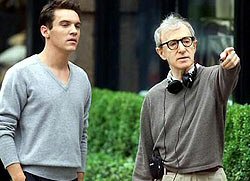
Johnathan Rhys-Myers, Woody Allen during filming of Match Point
Stockwell is in some Brazilian rain forest right now, making another hotbod-youths- in-peril movie called Turistas. Will he bounce back some day with something a bit more believable? Life is pain and choices and struggle…but I’d like to think so.
As far as I’m concerned, Steven Soderbergh’s Bubble, a very precise heart-of- proletariat-darkness drama, is reason to pop open the champagne and breathe easy for a change.
Soderbergh was falling off the horse repeatedly with Full Frontal, Solaris and the two Ocean’s movies…but he hunkered down and stayed with the process and that constant-state- of-becoming trip that all artists need to be into, and now he’s back.
How did William Friedkin manage to un-learn how to be the power-drive director he was when he made The French Connection, The Exorcist, Sorcerer, The Brinks Job and To Live and Die in L.A.?
I love the metaphor of an old dog trying out a new spin and making it work with a skeptical audience…like Woody Allen has done with his new film, Match Point. I love that Allen never quits.
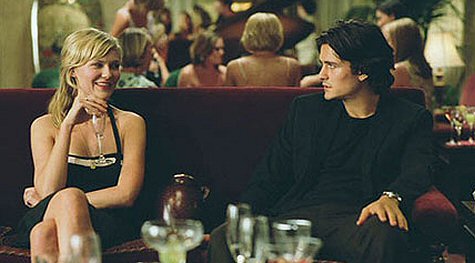
Elizabethtown
For years I didn’t know what to say to Francis Coppola when I would see him at parties because all I had in my head was, “Are you gonna make another film or what? Why are you putzing around with the wine business? You’re a lion and you’ve been sitting under a tree and licking that thorn in your paw for the last seven or eight years.”
Now, finally, he’s making a new film — Youth Without Youth, a period drama with Tim Roth, Alexandra Maria Lara and Bruno Ganz. Coppola’s script, about the travials of a fugitive in Europe before World War II, is based on a book by Roman- ian author Mircea Eliade. It’ll begin shooting in Bucharest early this month, accor- ding to Variety.
I saw a movie a while back that was directed by a smart talented guy, someone who’s probably going to be around for the next three or four decades. It’s not a “bad” film — the guy has a voice and knows from brushstrokes and has the chops to make the various elements fuse together and all — and it’s got some scenes that touch bottom and are well charged.
But I really didn’t like the main character, and I was honest with the director about my feelings, and he took it like a grown-up and didn’t say I was wrong but said others have felt differently, and that he’s certainly proud of it.
He also said that once a director starts trying to hold onto a groove and/or repeat a past success he’s doomed…and he’s right.
Mr. Lloyd
“Thanks for your piece on Norman Lloyd. As an actor myself, I found his ‘just say the words’ advice as succinct and perfect an acting class one could hope for. It really is that simple, although making it come alive is the difficult part…something Lloyd has been doing his entire career. We should all be lucky and be like him when we get to be 91.” — Edward C. Klein
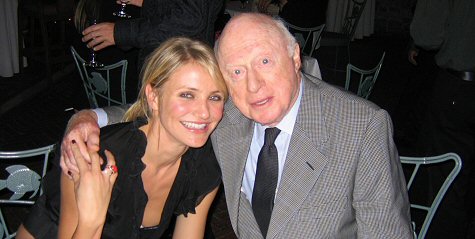
Shoes
“I interviewed almost the whole In Her Shoes team — Cameron Diaz, Toni Collette, Shirley MacLaine, Susannah Grant and Curtis Hanson — during the Toronto junket, and they all spoke with a bit of exasperation about the perceived difficulties of marketing the film.
“Every one of them was adamant about was that the press not call it a ‘chick flick.’
“Grant was particularly funny in addressing the topic: ‘No one asks Michael Bay how it feels to make a dick flick,’ she noted. MacLaine asked, ‘Who is the target audience for this movie? Families — but it’s not Disney.’ She said they’re trying to get the message across that it’s a story about a dysfunctional family overcoming their problems and learning to put the past in its place.

Cameron Diaz, Shirley MacLaine in In Her Shoes
“When Hanson was asked about the ‘chick flick’ label, he sighed. ‘I’ve been down that road,’ he said. ‘I didn’t want 8 Mile labeled a hip-hop movie because while that appeals to a certain segment of the audience, there’s a whole other world of potential audience that it’s a turn-off to. I wanted that movie to be broader than that.
‘But at a certain point, it’s like a wave coming in and you’re trying to stop it…but there’s also a compliment that comes with it, when you meet someone who says, ‘I hated hip-hop and I hated Eminem, and I went to see that movie and I was surprised.’ With this picture, time and again, people keep saying, `Maybe I wasn’t that interested and I thought it was a `chick flick,’ but I really connected with it.’
‘So if the story ends up being, ‘It looks like a chick-flick but’… and the ‘but’ leads to something interesting, then I accept it. I’m not going to keep beating my head against the wall.”
‘Even Diaz claimed to be embarrassed by the teaser poster that only shows her. She said her reaction when she first saw it was a baffled “What the f— is that?” — James Sanford
“Just wanted to say I’m anticipating In Her Shoes big-time thanks to your recent articles about it.
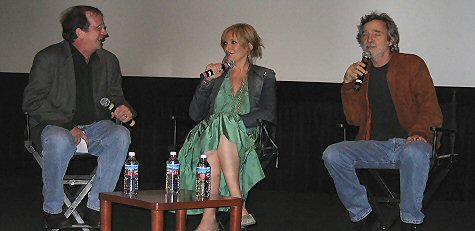
(l. to. r.) Variety screening series host Pete Hammond, In Her Shoes star Toni Collette, and director Curtis Hanson during post-screenign q & a at Hollywood’s Arclight — Monday, 9.26, 9:50 pm.
“I have always been into movies that kind of abuse you, unhealthy as that sounds. My favorite films are tearjerkers, war films that make you feel like crap, and horror movies that scare the shit out of you. All things that play on negative emotions.
“I look forward to Curtis Hanson movies. I liked L.A. Confidential a lot, and Wonder Boys further proved that he had something going on (though I didn’t really get it… it seemed like something was there…maybe I’m dumb). 8 Mile was so-so but hey, if Curtis Hanson has made a tearjerker that works, I’ll be the first in line.
“Any movie that makes you confront negative emotions in a powerful way is da bomb.” — Steve Clark
Wells to Clark: Wonder Boys was at least partially about the place you’re in when you’re ripped on really good weed. If you’ve never turned on, the movie wouldn’t work as well for you.
Clark to Wells: That might explain it.
Hey…
“Could you please stop listing Soderbergh’s Solaris in his row of ‘failures’? I get the other titles you mention (even though I sorta enjoyed most of those as well), but I consider his Solaris to be a brilliant film, and I know I’m not alone.
“It’s your opinion, of course, but are you just putting it in there because it failed commercialy? It is certainly an artistic triumph, as far as I’m concerned.” — Reint Scholvinck, who didn’t say what city or country he’s from although he seems to be from Norway or Sweden or one of those places in which people’s last names end with “vinck.”
Wells to Scholvinck: Solaris struck some people as some kind of profound or moving thing, yes. It was spooky — it had an undercurrent. It was made by and for people of some intelligence. But while it mostly took place on a space station it was not really about matters of space travel or exploration or, even in a nominal sense, anything technical or celestial. It was about loss and dark fantasy and then death.

George Clooney dies at the end, willfully as I recall it, crashing into terra firma with the space station because his beautiful wife (Natascha McElhone) is really and truly dead. Why? What did this achieve in terms of resolving the story or fulfilling themes? It would have been a bit more interesting to me if Clooney’s character had stayed on earth and coped with McElhone’s ghost in his own home.
Solaris was a lot of very fancy footwork and indications of heavy-osity. But it was obvious to anyone that it was, at heart, an expensive, generally nebulous art film about a dead wife that didn’t add up to a whole lot. That’s why it didn’t make any money. People have lowball tastes, yes, but they aren’t stupid. They took a look and said to themselves, “What the fuck is this?”
I’m not into suicide, personally. If my beautiful wife is dead, she’s dead, and my being dead won’t bring me any closer to her.
Death isn’t a membrane that you pass through, and on the other side is some romantic playground in which you can frolic and make love and walk your dog. Death is death…lights out, power off, adios. At best you’re off to your next life as a baby without any memory of your past lives, or you’re an invisible cosmic emissary soaring through the universe. Whatever…no Natascha.
Ivory Tower vs. 7-11
“Every time you talk about your disconnect with the jaded ivory-tower
elites who fail to get In Her Shoes, or how deeply you’re in touch with your blue-collar Jersey roots and how the mainstream avoidance of Hustle & Flow means that your working-man peers let that movie down, I swear to you that I plotz, and I’m not even Jewish.
“I get that critics are supposed to treat their opinions as gospel, the absolute inviolable revealed truth that brooks no other interpretation. Even if a critic doesn’t necessarily believe that about his opinions, that’s the rhetorical stance from which he is expected to issue his writing, without a lot of hedging.
“But you seem to believe it…to actually believe it-believe it. I could cherry pick ten selections of your work and show them to ten people and ask, ‘Is this guy in the ivory tower or not?’ and they would all say yes, but then some writers don’t like In Her Shoes as much as you and suddenly you’re a class warrior.

“The truth of it is — and I hate to break this to you — that you are not the standard-bearer of perfectly refined taste, the dweller at the crossroads of piffle and pretension with no personal idiosyncrasies to deter you from determining which movies deserve sellout crowds. Deviance from your picks and pans does not signal the demolition of popular culture on the one hand, or the stultification of the Film Comment crowd on the other.
“As a device to get me to value your opinion a bit more, this whole last-honest-man shtick just doesn’t work. Perhaps I should append ‘for me’ to that, but I think I might have actually stumbled upon some inviolable revealed truth.” — Sean Weitner
Wells to Weitner: Before I discovered — accepted — my blue-collar, man-of-the- people thing, I was in constant torment as a writer. Now that I’ve embraced who I am, it’s still hard…but it’s nowhere near as difficult to bang out the column, so I must be on to something.
I know “good” when I see it or feel it, even if I don’t like it, and that quality-meter I have inside me comes in part from being attuned to ivory-tower pretensions and affected intellectual posturings, etc. and trying to stay clear of that.
I always imagine myself standing in a parking lot outside a 7-11, and that’s how I find the words and the attitude. I may be some kind of elitist…I mean, you can throw that at me, but anyone who tries to appreciate the best in film art is going to resent lowbrow philistine tastes in movies.
The bottom line is that I know who I am and where I come from — the towns of Westfield, New Jersey, and Wilton, Connecticut — and being in touch with that middle-class, 7-11, never-finished-college way of looking at things is my biggest strength as a writer. I mean, along with my tenacity.
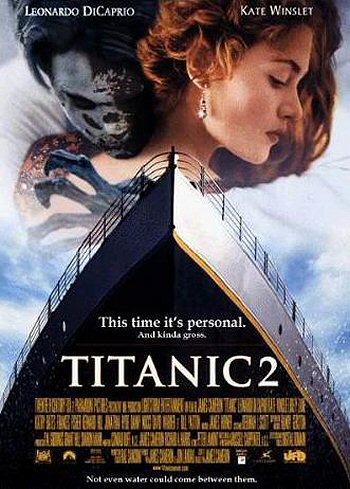
There is a tendency among learned know-it-alls to recoil from heart movies. I do it all the time — I hate icky emotionalism — but in the final analysis the critical divide between cheap and/or coyly manipulative heart movies and ones that really touch bottom and address commmon issues in an adult way is craft. Craft and honest emotion is there in In Her Shoes. There’s no question about that.
There are such things as emotional pores, and you and I know that ivory-tower elites tend to maintain a state of guardedness and wariness with such films, because if they appear overly susceptible to emotional films they are dead meat as far as their peers are concerned. Elites don’t tear up in movies like regular people do, and they don’t laugh as loudly, and so on.
You will not find a single ivory-tower elite these days who will speak favorably of Titanic. They’ve all been told to deride it and every last one of them does…but the fact is that the final 15 minutes of that film gets people where they live, and the elites can foxtrot and sidestep all they want but that movie wouldn’t have scored those hundreds of millions if it hadn’t delivered a very strong emotional current.
Elites always pooh-pooh emotion. I know this is because I’m one of them. I know exactly where they live.
Weitner to Wells: I’m not saying you’re full of shit, and I’m certainly not doubting the quality of In Her Shoes — after Wonder Boys, I would be happy to watch anything Curtis Hanson wanted to put onscreen, because I think he really has that studio artisan knack.
“And, like you, I’ve had to defend Titanic from hecklers in the intervening years. So I know very much where you’re coming from.

“Where I’m still stuck is this idea of objectively identifiable craft-cum-worthiness, and a monolithic body of tower dwellers who reject worthy movies for being emotional. I think the matter is more, as you say, that you, and I, and everyone out there that writes about movies, has a touch of the ivory tower in them that flares up when our personal taste runs contrary to popular opinion, expressed in the box-office or elsewhere.
“Of all the professionals I read, and all of the pro-ams with whom I associate, and even the few film academics under whom I’ve studied, all of them go to movies for the emotion.
“Sure, we can find some Andrew Sarris or Jonathan Rosenbaum reviews to build a case that they’re out of touch, but your persistent appeals to some nebulous elite that’s out there and against whom you defend quality movies — or when the proles let you down by not taking a chance and exposing themselves to the paragons of craft you’ve uncovered — doesn’t prima facie make your opinion any more valuable or valid, and in some ways it detracts from it.
“When there are specific pieces of wrongheaded criticism that you want to bring up and pick apart — that’s entirely appropriate and can be terrifically illuminating. Sometimes a stated viewpoint needs challenging. But attributing opinions to some Village Voice boogeyman, as opposed to some actual writer with whom you want to tangle, doesn’t do anything to bolster your argument.”
Wells to Weitner: Point not entirely accepted, but taken.

Caan Wrath
True Patriot: Maybe because I just watched this week’s My Name is Earl (should I point out that I did this from a copy a downloaded using BitTorrent, which will kill Tivo in a few years?)…
Wells: How is downloading from BitTorrent going to kill Tivo? Explain…I’m really curious.
True Patriot: But when I got to the inevitable ‘How I Was Mistreated This Week’ section of your Wired blog (Scott Cann standing you up in Soho)….
Wells: The Scott Caan thing was triggered by seeing him in Into the Blue. I don’t run how-I-was-mistreated stories with any regularity. I don’t run them irregularly.

Scott Caan
True Patriot: I had to wonder if you have considered that perhaps these things happen because of karma?
Wells: Have you considered that Scott Caan, being the big swinging dick and all, may have succumbed to thoughtlessness?
True Patriot: Ever stopped to consider that one man’s “telling it like it is” is another’s rude, pretentious egotist?
Wells: Yeah, I realize that. And if you don’t like the way I tell it, you can do whatever.
True Patriot: That maybe these little shocks-to-the-system are karmic paybacks?
Wells: I didn’t want to get into this as heavily as I am now, but Scott Caan not showing for an appointment is one thing. Not leaving a note to explain or calling after-the-fact to apologize is another. All I said in the item was, this is what Scott Caan, man among men, didn’t do. What’s your problem?
True Patriot: I’m just saying….
Grabs

